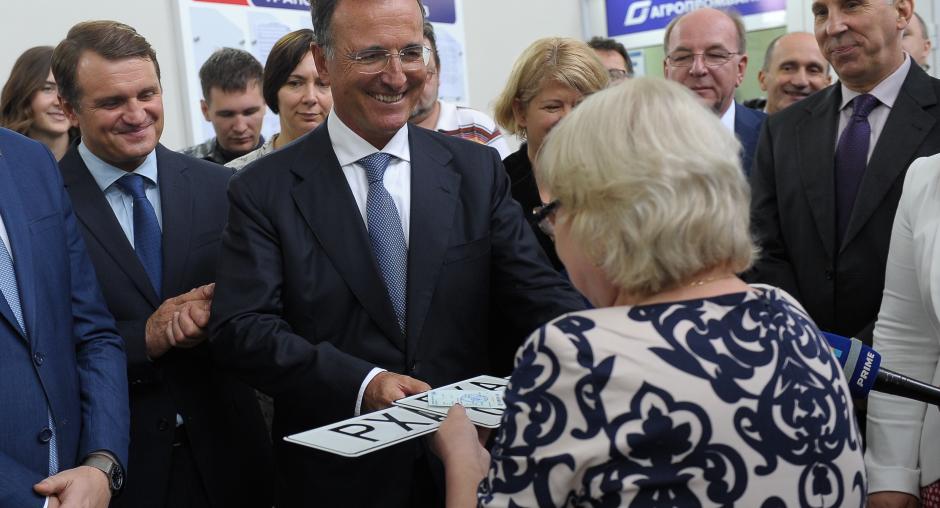OSCE Special Representative lauds progress in Transdniestrian Settlement Process, calls for all commitments to become reality

TIRASPOL, 10 September 2018 - The Special Representative of the OSCE Chairperson-in-Office for the Transdniestrian Settlement Process, Franco Frattini, handed over the first Moldovan neutral-design licence plates to first applicants at a Vehicle Registration Office (VRO) in Tiraspol today. Frattini is visiting Moldova on 9 and 10 September to mark a new milestone achieved by the Sides in the Transdniestrian Settlement Process.
Chisinau and Tiraspol have met the commitment they made in the 5+2 Rome Protocol of 30 May to open two VROs on 1 September in line with the 24 April Agreement on a mechanism for the participation of vehicles from Transdniestria in international road traffic. Located in the left-bank cities of Tiraspol and Ribnita, the two offices were opened with funding from the Italian OSCE Chairmanship and the OSCE Mission to Moldova.
“A fully operational mechanism that allows vehicles to participate in international road traffic brings tangible benefits to the population. It is a confirmation of the commendable engagement and political will of the leaderships in Chisinau and Tiraspol to make progress in the settlement process,” Special Representative Frattini said. “The Agreement implemented reaffirms my full confidence that the Sides will honour the remaining commitments from the 5+2 Rome Protocol to close the outstanding priorities from the ‘package of eight’ related to telecommunications, criminal cases and the freedom of movement.”
The representatives of the 5+2 format present at the event applauded the Sides for the implementation of the fifth agreement from the “package of eight”. The remaining agreements are expected to be finalized by the Sides by the end of 2018.
Commenting on the event, the OSCE mediator and new Head of the OSCE Mission to Moldova, Claus Neukirch, praised Chisinau and Tiraspol for following the output-based approach to advancing the negotiations. “It is very reassuring to see how the outputs of the tireless efforts undertaken by the Sides on the ground are benefiting the lives of people on both banks. The breakthrough we all witness today is the result of the local ownership and the growing trust between the two Sides, which will be the driving force to finalize the remaining issues by the end of 2018 as agreed upon in the Rome Protocol,” Neukirch said.
Since the beginning of 2018, in addition to the licence plate agreement, the Sides have implemented agreements on the access to the Dubasari farmland, the functioning of Latin-script schools on the left bank, the apostilization of Transdniestrian university diplomas and the opening of the Gura Bicului – Bychok bridge. With the resolution of the issues related to the freedom of movement, criminal cases and the implementation of the telecommunication agreement, the Sides will have met their commitment, documented in the 5+2 Rome Protocol, to have fully finalized the “package of eight” by the end of 2018.
Talks in the 5+2 format include the representatives of the Sides, mediators and observers – Moldova, Transdniestria, the OSCE, the Russian Federation, Ukraine, the United States and the European Union.
The goal of the 5+2 talks is to work out the parameters of a comprehensive settlement based on the sovereignty and territorial integrity of the Republic of Moldova within its internationally recognized borders with a special status for Transdniestria, as reconfirmed by all 57 OSCE participating States in Ministerial Council Statements agreed upon in 2016 and 2017.
